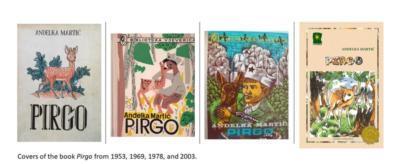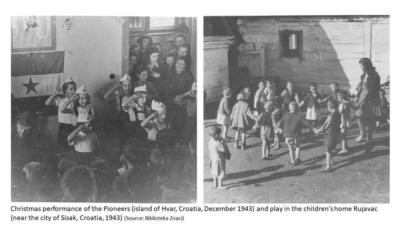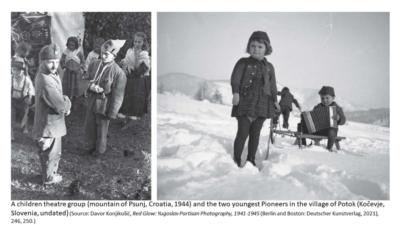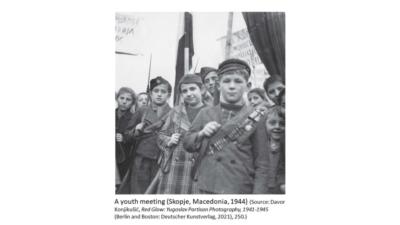Pirgo
During an enemy bombardment, five-year-old Željko, “the smallest Partisan in the Slavonian forests,” hid in the woods. There he stumbled across a fawn that, it seems, had just become an orphan due to an enemy bomb. The boy and the fawn, whom Željko named Pirgo because of its freckles, were almost inseparable during the next year, and all the fighters of the Sixth Corps of Slavonia knew about them.
“You were a kiddie in a Partisan uniform. I met you in the spring of 1943 on the road to Voćin, where the Sixth Corps commissariat was passing,” Anđelka Martić, a former fighter of the XVIII Brigade of Slavonia, recounted to the already grown-up Željko. “I heard stories about your fawn,” she continued, “and already then I promised myself that I would write a novel for children about the two of you.”
The story of Željko and Pirgo is, of course, a story about fear before the dangers of war. Even more, it is a story about the mutual recognition of two powerless solitudes. The boy and the fawn were brought together in a world they did not actually belong to, and they created a tiny community based on friendship and tenderness.
The fact that the Partisan community in which the two lived during that one year showed not only understanding, but also content and even amusement with the situation – the soldiers checked in on Željko and Pirgo, sometimes teased them, and the duo even visited the nearby Partisan hospital in order to entertain and cheer up the wounded and sick who were recovering there – witnesses that even adults enjoyed the small everyday pleasures of this completely unusual friendship.

Importantly, in the Yugoslav People’s Liberation Movement, there were many families with children; Željko’s parents were active members of the Partisan army. In addition, wartime institutions tried to take care of war orphans throughout the country. Many children, when it was possible, were placed in Partisan children’s homes, and some, just like Željko, became a part of Partisan structures. Some children helped in Partisan hospitals, boys often helped in military units, mostly in auxiliary roles, and sometimes as couriers and even fighters. Some preserved photographs bear witness to the lives of children among the Partisans.



Sources:
Anđelka Martić, Pirgo (Zagreb: Mladost, 1953).
Veronika Mesić, “Anđelka Martić i herojska priča o Pirgu” [“Anđelka Martić and the Heroic Story about Pirgo”], interview by Veronika Mesić, Vox Feminae, May 1, 2019, https://voxfeminae.net/strasne-zene/andelka-martic-i-herojska-prica-o-pirgu/.
Toni Šimunović. “/Ne/poznati junaci iz pet ratnih romana” [“/Un/Known Heroes from Five War Novels”], Arena 6, no. 132 (July 5, 1963), 4-5.
